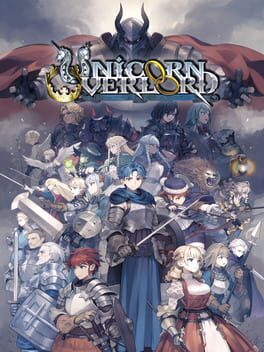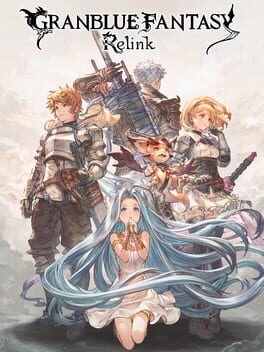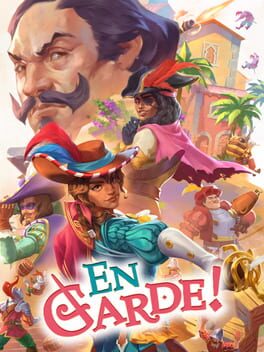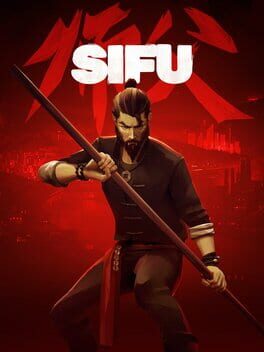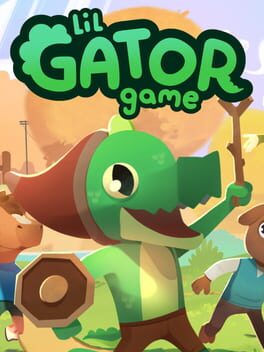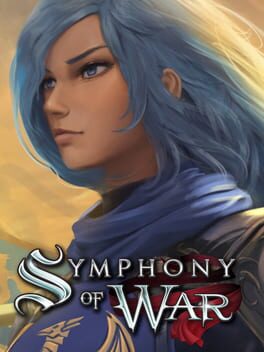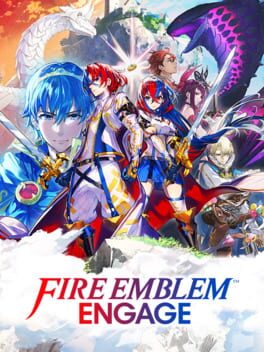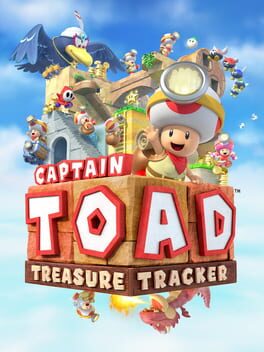Gooble
BACKER
2024
I've had some magical moments in this, mostly through the magic of learning the workings of the world and mechanics. Seeing how systems interact with each other to create unique situations is truly inspired. After 20 hours, though, it seems that the game ran out of lessons to teach me. Without a story to tell, then, Dragon's Dogma 2 lost its luster to me. I think I'll leave this Dragon to slumber for a while, and return later to see what stories it has dreamt up while I was away.
2024
2023
2023
Playing En Garde and SIfu in a short timespan has really helped me compare and contrast these two setpiece fighters (that's not a genre but whatever man). Where Sifu wants to evoke martial arts movies, En Garde wants you to feel like Inigo Montoya or Puss in Boots. Where Sifu demands precision and repetition, En Garde encourages you to play around and try daring schemes. All of these differences are what enticed me to try out this game in the first place. One difference, though, puts it slightly behind Sifu in my opinion - En Garde is just not as polished of a game. Your movement is often going to clip on the environment, and enemy attacks have a homing quality to them that makes fights in large groups a little more chaotic than they should be.
I feel bad for having such a negative tone when writing this, because there is a terrific sequel just begging to be made here. En Garde almost feels like a tryout for the big one following this game up - music and visuals are enchanting and whimsical, characters are endearing and the basic mechanics powering combat naturally nudge you into the boots of the games' heroine. If only the game was in the oven slighty longer - both to even out the games' rough edges and add a little more meat on its bones. I'm eager for what comes next!
I feel bad for having such a negative tone when writing this, because there is a terrific sequel just begging to be made here. En Garde almost feels like a tryout for the big one following this game up - music and visuals are enchanting and whimsical, characters are endearing and the basic mechanics powering combat naturally nudge you into the boots of the games' heroine. If only the game was in the oven slighty longer - both to even out the games' rough edges and add a little more meat on its bones. I'm eager for what comes next!
2022
Perfection requires repetition, repetition requires a steel purpose. SIfu's take on a roguelike beat 'em up inspired by martial arts movies is a montage player's heaven. Every level offers a slick setpiece for your own personal choreography of violence.
I've always wanted to try this game out, despite its reputation as an unforgiving master. Games with a perfect parry mechanic always scare me a little bit, because they require an amount of focus and repetition that my ADHD brain does not experience as a nice way to have fun. Luckily, Sifu offers more ways to look like a total badass. Through clever use of the environment, knowledge of your enemies and a diverse moveset you can overcome the challenges the game throws your way without too much trouble if you set your mind to it.
Facing off against the games' final boss, however, offered much less of this wiggle room. While I'm sure beating them is an exhilirating experience, it is just not what I'm personally looking for in games - which leaves the game shelved (for now) unfinished. That doesn't take away one bit from how fun all the other levels are, and the replayability on offer is insane. Try this one out!
I've always wanted to try this game out, despite its reputation as an unforgiving master. Games with a perfect parry mechanic always scare me a little bit, because they require an amount of focus and repetition that my ADHD brain does not experience as a nice way to have fun. Luckily, Sifu offers more ways to look like a total badass. Through clever use of the environment, knowledge of your enemies and a diverse moveset you can overcome the challenges the game throws your way without too much trouble if you set your mind to it.
Facing off against the games' final boss, however, offered much less of this wiggle room. While I'm sure beating them is an exhilirating experience, it is just not what I'm personally looking for in games - which leaves the game shelved (for now) unfinished. That doesn't take away one bit from how fun all the other levels are, and the replayability on offer is insane. Try this one out!
2023
2022
Symphony of War is a game as ambitious as its characters are. Like the heroes of this tale of war, the game accomplishes most of its goals despite its rough edges.
Symphony of War: The Nephilim Saga is a tactical RPG focused around the horrors of warfare. It lets you tweak and upgrade your squads, like in Fire Emblem or Tactics Ogre. What is exciting about Symphony of War, however, is that the game's squads are comprised of units. Each of these units can be upgraded individually, and can even lead squads of their own if you decide to do so. This gives the game incredible depth and choice in between its battle chapters.
During battle, choice doesn't end: You will be using lots of units, each of which can use battle stances that affect how the squad behaves on the field. The game's maps, while not revolutionary, are servicable - they are littered with side objectives that aid your effort in later chapters, and provide interesting gameplay objectives that connect with the narrative at play. The game of Symphony of War is incredibly fun and interesting. It lets you tweak, fiddle and tinker your army to your hearts content on your way to the final battle.
As for the story, Symphony of War starts off as a generic fantasy fare that carries the game well. Betrayals, iconic character types and some interesting lore provide plenty to carry you through the various chapters of the early game. As the game's story builds its tension, however, I started to get a little uncomfortable with its characters and narrative. While the game seems to be a commentary on war and authoritarian power, it also seems rather enamoured with power and the singular people that wield it to change history. The powerful seem to always be right in their actions in the end, and while killing is denounced, the characters often rejoice in the act. The game's romances are also rather stilted and can come off rather exploitative in some cases, probably owing to the lack of time given to their development: sometimes characters will be given a prompt to bond with no prior interactions. The game's later narrative left me a bit disconnected, as I questioned whether I should relate to the characters or condemn their actions.
That didn't stop me from completing Symphony of War though - As in war, the line of morality often becomes blurred. Here, the line between fun and serious messaging got rather fuzzy. Luckily, the stakes aren't as high when you're playing a game on your Steam Deck.
Symphony of War: The Nephilim Saga is a tactical RPG focused around the horrors of warfare. It lets you tweak and upgrade your squads, like in Fire Emblem or Tactics Ogre. What is exciting about Symphony of War, however, is that the game's squads are comprised of units. Each of these units can be upgraded individually, and can even lead squads of their own if you decide to do so. This gives the game incredible depth and choice in between its battle chapters.
During battle, choice doesn't end: You will be using lots of units, each of which can use battle stances that affect how the squad behaves on the field. The game's maps, while not revolutionary, are servicable - they are littered with side objectives that aid your effort in later chapters, and provide interesting gameplay objectives that connect with the narrative at play. The game of Symphony of War is incredibly fun and interesting. It lets you tweak, fiddle and tinker your army to your hearts content on your way to the final battle.
As for the story, Symphony of War starts off as a generic fantasy fare that carries the game well. Betrayals, iconic character types and some interesting lore provide plenty to carry you through the various chapters of the early game. As the game's story builds its tension, however, I started to get a little uncomfortable with its characters and narrative. While the game seems to be a commentary on war and authoritarian power, it also seems rather enamoured with power and the singular people that wield it to change history. The powerful seem to always be right in their actions in the end, and while killing is denounced, the characters often rejoice in the act. The game's romances are also rather stilted and can come off rather exploitative in some cases, probably owing to the lack of time given to their development: sometimes characters will be given a prompt to bond with no prior interactions. The game's later narrative left me a bit disconnected, as I questioned whether I should relate to the characters or condemn their actions.
That didn't stop me from completing Symphony of War though - As in war, the line of morality often becomes blurred. Here, the line between fun and serious messaging got rather fuzzy. Luckily, the stakes aren't as high when you're playing a game on your Steam Deck.
2015
When a game demands you replay levels based on a spinning wheel to progress, I don't feel like it respects my time. That's a shame, because I feel the core game loop itself is decent enough. The loop is sadly surrounded by strange decisions, all of which seem to try to tear you away from its main pull (pun intended).
2023
Fire Emblem engage is a game of opposites, quite like its colgate-influenced protagonist.
I am a sucker for tactics RPGs. I will spend hours tinkering away at characters, concocting builds that pique my interest or fit my idea of a character's aesthetic. I also genuinely love the tense trade-off between tactical efficiency and narrative connection that these games allow for when a permadeath mode is available: Do I want to win this battle at all costs, or does a swift victory require a sacrifice too heavy to carry? This tradeoff, it seems, is one that Engage is not interested in.
While Engage's tactics are incredibly satisfying, flashy and fun to experiment with, it gives you very little reason to care about you doing so. While the story of Engage has been derided thoroughly already, I think a part of the discussion that goes underserved is how actively it encourages you to disconnect from its cast of characters in favor of enhancing the puzzle element of Engage's battles.
Let me explain. Engage tosses many mechanics at you to allow you to tweak your characters to your heart's content. Emblem Rings with special powers, class changes, engraving weapons, you name it - Engage begs you to spend its plethora of resources and currencies on various stat upgrades and abilities. That is great: I spent the better part of the early game ranking up my favourite, usally sub-par characters to see if I could turn bronze to gold. For a while, this loop paid off - I saw my faves grow and dominate the battlefield.
Then, Engage picks up the pace and decides it wants to be meaner. Enemies hit harder and take fewer damage. Bosses get not two, but three healthbars. Even the slightest mixup and positioning leaves your character dangerously exposed to a one or two-hit kill. Suddenly, experimentation with what I wanted my characters to do had to make way for what felt like a process of optimizing for what the game demanded of me. I couldn't see my characters as the imperfect warriors they were, instead having to treat them as insufficient game pieces. Pair this with incredibly lackluster story development and support scenes and my mechanical and narrative attachment to Engage's units was wavering.
Don't get me wrong, the mechanics of Engage are great. Maps will throw interesting scenarios at you, challenging you to think of new ways to use your units or plan out your movements around the level. In the beginning, they are also incredibly snappy. There's no downtime of moving characters around without decisions to make, or situations in which you have to dogpile units on a tanky enemy. This starts to become more frequent in later levels, however, when risk is high enough to warrant slow, plodding play and juggling aggro lines. Again, the sheer gaminess of Engage was rearing its head.
Now, I still rate this game quite well. While Engage is a game, it is a damn good one. If you go into it knowing you will get a beautiful, uncompromising puzzlebox of fantasy tactics, you will be satisfied. I was just hoping for something to attach to. I suppose I will have to go and find a different emblem ring to wear.
I am a sucker for tactics RPGs. I will spend hours tinkering away at characters, concocting builds that pique my interest or fit my idea of a character's aesthetic. I also genuinely love the tense trade-off between tactical efficiency and narrative connection that these games allow for when a permadeath mode is available: Do I want to win this battle at all costs, or does a swift victory require a sacrifice too heavy to carry? This tradeoff, it seems, is one that Engage is not interested in.
While Engage's tactics are incredibly satisfying, flashy and fun to experiment with, it gives you very little reason to care about you doing so. While the story of Engage has been derided thoroughly already, I think a part of the discussion that goes underserved is how actively it encourages you to disconnect from its cast of characters in favor of enhancing the puzzle element of Engage's battles.
Let me explain. Engage tosses many mechanics at you to allow you to tweak your characters to your heart's content. Emblem Rings with special powers, class changes, engraving weapons, you name it - Engage begs you to spend its plethora of resources and currencies on various stat upgrades and abilities. That is great: I spent the better part of the early game ranking up my favourite, usally sub-par characters to see if I could turn bronze to gold. For a while, this loop paid off - I saw my faves grow and dominate the battlefield.
Then, Engage picks up the pace and decides it wants to be meaner. Enemies hit harder and take fewer damage. Bosses get not two, but three healthbars. Even the slightest mixup and positioning leaves your character dangerously exposed to a one or two-hit kill. Suddenly, experimentation with what I wanted my characters to do had to make way for what felt like a process of optimizing for what the game demanded of me. I couldn't see my characters as the imperfect warriors they were, instead having to treat them as insufficient game pieces. Pair this with incredibly lackluster story development and support scenes and my mechanical and narrative attachment to Engage's units was wavering.
Don't get me wrong, the mechanics of Engage are great. Maps will throw interesting scenarios at you, challenging you to think of new ways to use your units or plan out your movements around the level. In the beginning, they are also incredibly snappy. There's no downtime of moving characters around without decisions to make, or situations in which you have to dogpile units on a tanky enemy. This starts to become more frequent in later levels, however, when risk is high enough to warrant slow, plodding play and juggling aggro lines. Again, the sheer gaminess of Engage was rearing its head.
Now, I still rate this game quite well. While Engage is a game, it is a damn good one. If you go into it knowing you will get a beautiful, uncompromising puzzlebox of fantasy tactics, you will be satisfied. I was just hoping for something to attach to. I suppose I will have to go and find a different emblem ring to wear.
I started Captain Toad on a whim, thinking its cuddly exterior would be perfect for the short train ride I was on. While its inviting aesthetic got me through the door, Toad's adventure surprised me in how incredibly tight its leveldesign is.
Captain Toad's levels are intricate, interactive puzzleboxes that left me delighted in short, digestible bursts. While your options are limited to moving on a horizontal plane and pulling things out of the ground, the game constantly one-ups itself with the amount of ways it can make those simple mechanic sing in harmony with the level's challenge, art and music.
For a week, I looked forward to my commute. Hopping onto a train, unfolding my 3DS and exploring a few levels was a perfect way to unwind. I thoroughly recommend you uncover this treasure for yourself!
Captain Toad's levels are intricate, interactive puzzleboxes that left me delighted in short, digestible bursts. While your options are limited to moving on a horizontal plane and pulling things out of the ground, the game constantly one-ups itself with the amount of ways it can make those simple mechanic sing in harmony with the level's challenge, art and music.
For a week, I looked forward to my commute. Hopping onto a train, unfolding my 3DS and exploring a few levels was a perfect way to unwind. I thoroughly recommend you uncover this treasure for yourself!
2007
Short but so very sweet.
Puzzles are nice and simple, but are just complex enough to have you stop and think for a while. Not only does that heighten the sense of accomplishment when you do solve a section - it also allows you to enjoy the delightful writing and acting for the games' villain (or friend?) GlaDOS.
The game is just an all around delightful package, that does not outstay its welcome whatsoever. Stoked to see what the sequel does with the formula!
Puzzles are nice and simple, but are just complex enough to have you stop and think for a while. Not only does that heighten the sense of accomplishment when you do solve a section - it also allows you to enjoy the delightful writing and acting for the games' villain (or friend?) GlaDOS.
The game is just an all around delightful package, that does not outstay its welcome whatsoever. Stoked to see what the sequel does with the formula!

